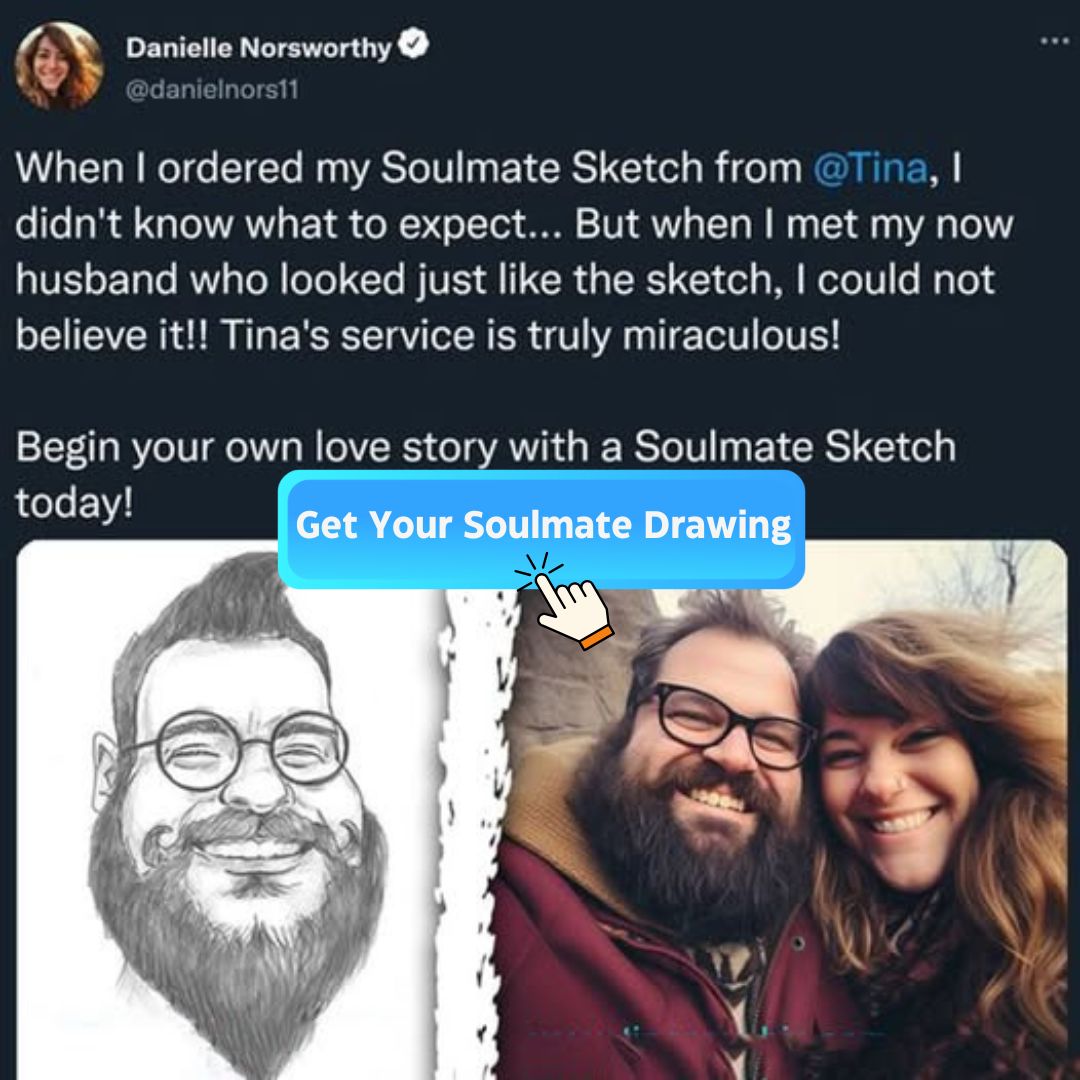The Truth Behind the Soulmate Sketch Scam: Unraveling Emotional Manipulation
In recent years, the concept of soulmate sketches has fascinated many individuals seeking deeper connections in relationships. However, it’s important to shed light on the darker side of this alluring idea. The soulmate sketch scam exploits emotional vulnerabilities, manipulating eager participants into paying for something that rarely delivers on its promises.
Many websites claim they can create a personalized sketch of your soulmate based on a few details you provide about yourself and your desires. But, how does this process really work? Let’s delve deeper to uncover the truth behind these scams.
Understanding the Soulmate Sketch Scam
The soulmate sketch usually begins with an enticing advertisement promising an incredible insight into your future love life. Here are some red flags to watch out for:
- Pressure Tactics: Many sites create a sense of urgency by indicating that the offer is available for a limited time. This emotional manipulation can lead to impulsive decisions.
- Lack of Transparency: Scammers often provide vague information about their “artists” or “psychics,” leaving you questioning their credentials.
- Positive Testimonials: Fake testimonials can fill a website to convince you of their credibility. An extensive search may reveal these reviews are not genuine.
- High Costs: Often, these services come with hefty price tags, which can be exploited for profit without delivering a legitimate product.
Emotional Manipulation Explained
It’s vital to understand how companies behind soulmate sketches use emotional triggers to profit from your desires:
- Exploiting Loneliness: Individuals looking for love or connection are often vulnerable and may turn to desperate measures. Soulmate sketches target this emotional need.
- Desire for Clarity: In a world filled with uncertainties about relationships, many seek reassurances. The promise of a soulmate can provide a temporary sense of certainty.
- Community and Connection: Many platforms promote a sense of belonging. However, they may manipulate this feeling to encourage ongoing purchases.
Are You Really Getting What You Pay For?
It’s crucial to analyze what you are truly receiving when you invest in these soulmate sketches. Often, the sketches provided are generic and lack the personal touch the service promises. Think about these points before purchasing:
- Quality of Work: Many sketches are poorly done or look similar to stock images. You might not be getting an original piece tailored to your specifics.
- Refund Policies: Be wary of services that do not offer a clear plan for refunds if you’re dissatisfied. Most reputable services back their promises.
- Service Experience: If the site lacks customer service or quicker response times, it may be a sign that they do not stand behind their product.
Protecting Yourself from Scams
As you explore the idea of soulmate sketches, consider these tips to protect yourself:
- Research: Always look for reviews from third-party sources. Sites like Better Business Bureau can provide information on the legitimacy of a company.
- Ask Questions: Don’t hesitate to contact them for more information about the process or the artist behind the sketch.
- Use Caution: If a deal seems too good to be true, it probably is. Trust your instincts and think critically about the offer.
In the end, understanding the mechanics of these scams is vital for safeguarding your emotions and finances. Instead of relying on potentially fraudulent soulmate sketches, focus on building genuine connections through healthy interactions and communication. For further reading on emotional manipulation in online services, you might check sources like Psych Central or specific consumer awareness platforms for additional guidance.
Recognizing Red Flags: How to Spot Deceptive Free Tools
In today’s digital world, many free tools claim to provide insights or support in various aspects of life. However, not all tools are what they seem, and some may exploit your emotions for profit. It’s vital to recognize the red flags that indicate deceptive tools so you can protect yourself. This will help you make informed decisions about where to invest your time and trust.
First, let’s consider the common signs of deception. These can include:
- Overly Emotional Language: If a tool heavily relies on emotional appeals or promises profound insights, it’s time to be cautious. Slogans like “Find your true love” or “Discover your destiny” should raise questions about the legitimacy of the service.
- Lack of Transparency: Legitimate tools often provide clear information about who is behind them and how they work. If you can’t find this information easily, it could be a red flag.
- Excessive User Testimonials: While testimonials can be genuine, too many glorifying reviews that sound scripted may indicate that they are fabricated. Look for balanced perspectives rather than glowing phrases.
- Hidden Fees: Many free tools will eventually try to upsell you or require payment for full benefits. Be wary if you find that the free version has extremely limited features.
- Poor Website Design: A hastily designed or poorly maintained website can indicate a lack of professionalism. If the website has broken links, spelling errors, or outdated content, consider it a warning signal.
When evaluating tools claiming to provide unique insights — like personalized soulmate sketches or astrology predictions — it is crucial to scrutinize their offerings. Tools that dig deep into personal aspects, such as relationships, often prey on vulnerabilities. Here are a few strategies to distinguish between genuine and deceptive tools:
- Research: Take the time to read reviews and articles about the tool. Websites like Quora can offer insights from other users’ experiences.
- Check for Credentials: Verify if the creators of the tool have valid qualifications or recognizable achievements in their respective fields. If not, they may not possess the expertise they claim.
- Social Media Presence: Look for presence on social media platforms. Genuine tools often engage with users on platforms like Facebook or Twitter. Deceptive tools might lack this interaction or have an inactive account.
- Trial Runs: If possible, explore whether the service has a trial run before commitment. A reputable tool should offer a taste of what it provides without asking for upfront payments.
Another essential aspect of spotting deceptive free tools is observing their marketing strategies. Many deceptive tools tend to promise results that sound too good to be true. Be skeptical of excessive claims such as “you will find your dream partner in just one sketch.” Always remind yourself that personal connections often take time and effort. Instead, the tool should focus on a holistic approach to personal growth instead of quick fixes.
Also, be on the lookout for tools that utilize your data without consent. If a tool requires you to share sensitive information or access your personal accounts without a clear explanation, that’s a major warning sign. Always ensure you know how your data will be used and stored. Review their privacy policy carefully, as this document should outline the protection of your information.
Trust your instincts. If something feels off, it probably is. Engaging with a service that seems overly pushy or anxious to get your money can lead to disappointment. Engaging with credible resources can lead you to more reliable tools. Look for recommendations from Consumer Reports or similar magazines that test out tools and provide unbiased reviews.
By being aware of these red flags and employing the strategies discussed, you can better navigate the landscape of free tools available today. The aim is to seek knowledge and support while guarding your emotions against exploitation. Stay informed, and make choices that truly serve your best interests.
The Psychology of Desire: Why We Fall for Relationship Scams
Every day, countless individuals find themselves drawn into the allure of online relationships, often leading to emotional and financial harm. Understanding the psychology of desire can help us grasp why people fall for these relationship scams. There are certain emotional triggers and psychological factors at play that can cloud our judgment and lead us into dangerous territory.
The Allure of Connection
At the core, humans have an innate desire for connection and intimacy. This fundamental need drives us to seek out relationships, whether they are platonic or romantic. When we feel lonely or vulnerable, we become even more susceptible to scammers. The excitement of finding someone who seems to understand us can be overwhelming. Scammers expertly exploit this basic need by presenting themselves as ideal partners, often through flattering messages and grand gestures of affection.
Emotional Manipulation
Scammers often employ various techniques to manipulate emotions. Here are some common strategies:
- Love Bombing: At the beginning of a relationship, scammers shower their targets with affection, making them feel wanted and cherished.
- Creating Dependency: Scammers will craft situations that make victims feel they need support, often portraying themselves as saviors.
- Playing on Insecurities: By preying on self-doubt or weaknesses, scammers create a false sense of camaraderie and intimacy.
These emotional tactics make it difficult for victims to see the reality of the situation, allowing scammers to maintain control and influence over their emotions.
Confirmation Bias
Humans naturally look for evidence that confirms their beliefs. If you desperately want to believe in a connection, you may overlook red flags in a scammer’s behavior. This bias is a powerful psychological force. You might find yourself rationalizing odd behaviors or ignoring inconsistencies in their stories. For example, if a scammer claims to be overseas for work, a victim might focus on the excitement of the relationship while dismissing signals that all is not as it seems.
The Role of Fantasy
In a world filled with loneliness, many individuals are drawn to the idea of a perfect partner. The fantasy of a soulmate or ideal companion can be intoxicating. Scammers play into this fantasy by appealing to dreams of love and companionship. When individuals engage with scammers, they are often not just talking to another person; they are interacting with a fantasy they’ve created in their minds. This disconnect makes it easier to ignore the harsh reality of being scammed.
The Impact of Social Media
In today’s digital age, social media platforms serve as breeding grounds for these scams. Websites like FTC.gov provide valuable insights into online safety, emphasizing the risks that accompany the pursuit of relationships online. With the ability to curate idealized personas, scammers have the tools to make victims believe they are dealing with genuine individuals. Images are often stolen from real people, further enhancing their deceptive game.
Escalation of Commitment
Once victims become emotionally invested, they are less likely to walk away, even in the face of evidence suggesting deception. This cognitive dissonance makes it challenging to reconcile their feelings with reality. As victims pour time, energy, and sometimes money into these relationships, they may feel they’ve already lost too much to let go. This is known as the escalation of commitment, and it keeps individuals caught in the scam longer.
Protecting Yourself
To safeguard against relationship scams, consider the following tips:
- Trust your instincts; if something feels off, investigate.
- Take your time; healthy relationships develop over time.
- Look for inconsistencies in their stories and check their claims.
- Be wary of anyone who asks for money or financial assistance.
By fostering self-awareness and recognizing the common psychological triggers, you can better protect yourself from falling victim to these dangerous scams.
For further information on identifying relationship scams and understanding their psychological impact, you may find helpful resources at Scamwatch.gov.au and ConsumerFinance.gov.
Protecting Your Heart: Steps to Safeguard Against Emotional Exploitation
Emotional exploitation can often go unnoticed, especially when it involves relationships. It’s essential to recognize the signs and adopt steps to safeguard your heart and well-being. By understanding how to protect yourself, you can avoid situations that may compromise your emotional health.
Recognize Vulnerabilities
Everyone has vulnerabilities, and acknowledging them is the first step toward protection. Consider the following:
- Past Experiences: Reflect on past relationships. What patterns do you notice? Understanding your emotional triggers can help you identify potential pitfalls in new encounters.
- Desire for Connection: You might feel compelled to form connections quickly. This eagerness can cloud your judgment. Take your time; there’s no need to rush into intimacy.
- Low Self-Esteem: Individuals with lower self-esteem might overlook red flags in favor of companionship. Work on building your confidence to better evaluate relationships.
Learn to Identify Red Flags
Before entering any relationship, be aware of the signs of emotional exploitation:
- Manipulative Behavior: If someone tries to control your actions or decisions, it’s a warning sign. Healthy relationships respect personal autonomy.
- Inconsistent Communication: If your partner often gives mixed messages or changes their story, it may indicate emotional instability or deceit.
- Excessive Flattery or Guilt: Be cautious of people who excessively flatter you or make you feel guilty for wanting to establish boundaries.
Set Healthy Boundaries
Establishing boundaries is crucial for maintaining emotional health. Here’s how you can set them effectively:
- Define Personal Limits: Know what behaviors you will not tolerate. Make these limits clear to others, and don’t hesitate to reinforce them when necessary.
- Communicate Openly: Having open communication with your partner fosters trust. Share your feelings candidly and encourage them to do the same.
- Practice Self-Care: Prioritizing your well-being is essential. Engage in activities that promote mental and emotional health, such as meditation, yoga, or journaling.
Seek Support When Needed
Sometimes, emotional exploitation can be tough to navigate alone. Don’t hesitate to seek help from trusted friends or professionals:
- Talk to Friends: Share your concerns with friends or family members who can provide honest perspectives and support.
- Consider Therapy: A counselor or therapist can help you unpack your emotions and provide guidance on handling manipulative behaviors.
- Join Support Groups: Connecting with others who have been through similar experiences can offer valuable insights and support.
Educate Yourself
Knowledge is power. Understanding emotional exploitation enables you to recognize it when it occurs:
- Read Articles and Books: Explore resources that focus on emotional health and personal boundaries. Websites like Psychology Today offer valuable insights.
- Attend Workshops: Join workshops that highlight emotional resilience and interpersonal skills. These can provide tools for navigating relationships wisely.
- Follow Experts Online: Engage with psychological experts on social media, as many provide bite-sized guidance on safeguarding emotional health.
Practice Mindfulness
Mindfulness is a powerful tool that can help in recognizing emotional exploitation:
- Stay Present: Focus on the current moment. If you frequently feel anxious or uneasy about a relationship, this can indicate underlying issues.
- Listen to Your Gut: Trust your instincts. If something feels off, it’s essential to investigate those feelings further.
- Reflect Regularly: Take time each week to reflect on your emotional experiences. This practice can help you spot trends and recognize when things aren’t right.
Ultimately, protecting your heart from emotional exploitation is about awareness and action. By recognizing your vulnerabilities, setting boundaries, and seeking support when needed, you can create healthy relationships that nurture rather than deplete you. Don’t hesitate to educate yourself on this topic further; there are numerous resources available to assist you, such as NAMI.
Empowering Yourself: Finding Genuine Connections Without Scams
In today’s digital age, finding genuine connections can sometimes feel overwhelming, especially with the presence of scams that prey on people’s emotions. It’s essential to empower yourself with knowledge and discernment to navigate these uncharted waters safely.
Understanding the landscape of online interactions is crucial. Many tools and platforms promise you connections, relationships, or even soulmate sketches, but often they take advantage of your emotional vulnerabilities. Here are some ways you can protect yourself while seeking authentic connections:
Recognize the Signs of Scams
Scams can manifest in various forms online. Here are common signs that might indicate you are dealing with a scam:
- Too Good to Be True: If claims about finding your soulmate appear overly optimistic or simplistic, they may be misleading.
- Lack of Transparency: A reputable service will provide clear information about their processes and pricing. If you can’t find clear answers, be cautious.
- Emotional Manipulation: Scammers often exploit your feelings of loneliness or desperation. Be wary of services that play heavily on your emotions.
- High-Pressure Tactics: If a service insists you must act quickly or offers limited-time promotions, it may be a red flag.
Empower Yourself with Knowledge
Taking the time to educate yourself about the potential pitfalls in the search for love will help you make informed choices. Researching companies or tools you are considering can save you from heartbreak and financial loss. Always look for:
- Reviews and Testimonials: Seek out feedback from previous users to gauge the legitimacy of the service.
- Customer Support: Does the company offer accessible support for its users? Legitimate services should provide assistance and answer your questions.
- Security Measures: Check if the platform uses encryption and safeguards your personal data.
Seek Authentic Connections
Knowing how to seek genuine connections is vital. Here are practical strategies to help you:
- Join Community Groups: Engage with local organizations or clubs that align with your interests. Meeting like-minded people in person fosters real connections.
- Utilize Reputable Dating Platforms: Use well-known dating apps that prioritize user safety. Sites like Match.com or eHarmony often invest in user verification and safety processes.
- Attend Events: Participate in social gatherings, workshops, or classes to expand your social circle naturally. This is an effective way to meet new people without the pressures of online dating.
Trust Your Instincts
When engaging with new people, it’s crucial to trust your gut. If something feels off, it likely is. Pay attention to how the other party responds to queries about their background or intentions. Healthy relationships are built on honesty, so ensure your potential connection shares that value.
Set Boundaries
Setting clear boundaries is vital when navigating social situations or online interactions. Here are some boundaries to consider:
- Time: Don’t rush into any relationship, online or off. Take your time to understand and evaluate the person you are connecting with.
- Openness: Be willing to share, but only to a point where you feel safe and comfortable.
- Personal Information: Protect your privacy by being cautious about sharing personal details until you’re certain about the person you’re dealing with.
Empowering yourself in your search for genuine connections is about being informed and proactive. By recognizing signs of potential scams, seeking authentic relationships, and prioritizing your emotional well-being, you can foster meaningful connections without falling prey to deceptive practices. Remember, genuine love and companionship are built on trust, respect, and understanding.
For additional resources on dating safely and building relationships, you can explore websites such as AARP Online Dating Safety Tips and FTC Identity Theft Prevention. These platforms provide valuable information that can enhance your journey towards finding genuine connections.
Conclusion
Understanding the reality of the Soulmate Sketch Scam is crucial for safeguarding your emotions and mental well-being. By unraveling the layers of emotional manipulation, you can become more aware of the tactics used to exploit your desires for love and connection. Recognizing red flags in deceptive free tools is an essential skill. Look out for vague promises, overzealous advertising, or requests for personal information that feel intrusive.
The psychology of desire plays a significant role in why many fall for relationship scams. The longing for companionship can cloud judgment, making individuals more susceptible. Awareness of this psychological trigger paves the way for informed decisions and healthier interactions. Protecting your heart involves conscious effort; seek out reputable sources and check reviews before engaging with any relationship service. Trust your instincts—if something feels off, it probably is.
Empowering yourself to find genuine connections without scams can lead to a more fulfilling love life. Surround yourself with supportive friends and family, and consider alternative avenues for meeting people, like community events or hobbies that genuinely interest you. Remember, authentic relationships are built on trust and mutual respect, not on the fleeting promises of online sketches. By taking these proactive steps, you can navigate the often turbulent waters of online connections, ensuring that you find real, meaningful companionship without falling prey to emotional exploitation. Stay vigilant, trust your instincts, and prioritize your well-being over the allure of a quick fix.





Pingback: Is He Your Soulmate Test - Psychic Soulmate